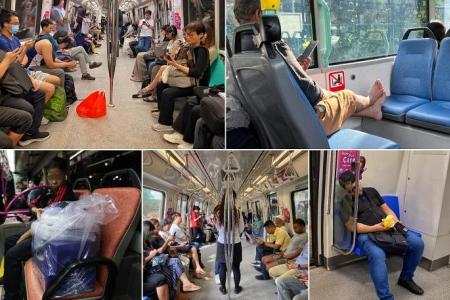Bad commuter etiquette: Blasting videos, hogging poles among S’poreans’ pet peeves
“You can hear (me) meh?” asked Mr Teo, as he ended his loud video call. The 49-year-old mover, who declined to give his full name, was recounting his day to a friend in a mix of Mandarin and Cantonese on an MRT train while on his way home.
Under the impression that no one else could hear him, Mr Teo continued chatting at a volume loud enough to be heard across the cabin. He was apologetic when The Sunday Times approached him.
Like many others, Mr Teo was oblivious to the impact of his actions on passengers around him.
Discussions about bad commuter behaviour on public transport have recently been reignited after a woman was arrested for getting into a dispute with a bus driver when she rested her feet on the bus seat.
Based on the 11,485 responses collected from a poll ST ran on Telegram, Instagram and LinkedIn last week, videos blared out at high volume on devices emerged as the top pet peeve among commuters, followed by passengers boarding trains or buses before others alight, and commuters who place their belongings on seats.
Here are the biggest public transport pet peeves, based on ST’s poll:
— People who watch videos with volume up: 48.6 per cent (5,579 votes)
— People who board before others alight: 30.8 per cent (3,539 votes)
— People who place their belongings on seats: 14.6 per cent (1,680 votes)
— People who hog grab poles: 6 per cent (687 votes)
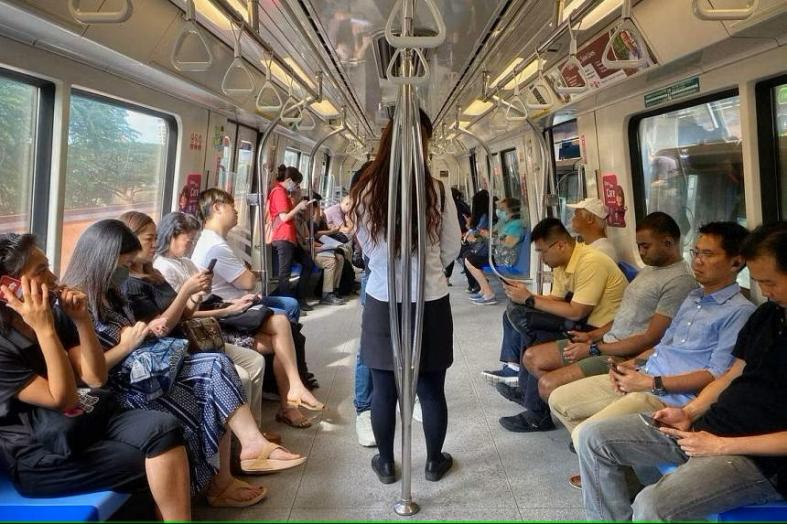
Based on ST’s observations, inconsiderate behaviour on public transport also includes young people not giving up seats to pregnant women and the elderly; eating on buses and trains; as well as not moving towards the back of buses and the centre of train cabins.
ST also interviewed 60 people last Wednesday and Thursday across the public transport network for their thoughts on inconsiderate commuter behaviour.
Affected commuters also spoke of couples publicly displaying their affection on trains, vaping on buses, manspreading, littering, and people grabbing poles after sneezing, coughing or digging their noses.
While many try to avoid confronting troublemakers on public transport, some commuters said they would call out bad behaviour if it causes too much of a disturbance.
Among those unafraid of voicing their unhappiness is part-time administrative executive Ari Sudi, 43, who has the habit of approaching passengers to ask them to give their seats up for others in need.
As someone who has taken the train while pregnant, Ms Ari hopes to help lessen the fatigue for pregnant commuters.
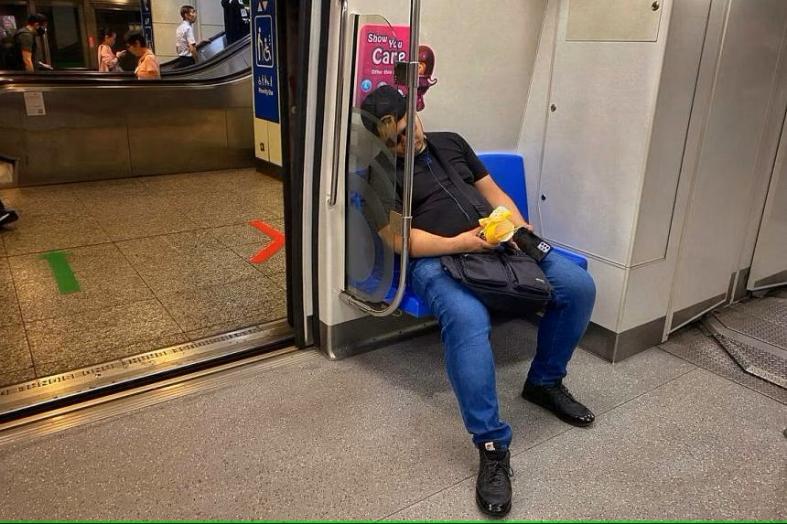
Similarly, Mr Douglas Chew, has no qualms about politely asking people to refrain from putting their legs up on bus seats.
“Instead of being complainers, we can just tell them nicely about their actions. Singaporeans should stop taking videos and embarrassing people online,” said the senior marketing director in his 40s.
Eye surgeon James Ang, 47, said he would not sit where other commuters have just removed their feet from because it is unhygienic.
It is, however, their “free choice” to put their feet up, so he would not call them out on their behaviour.
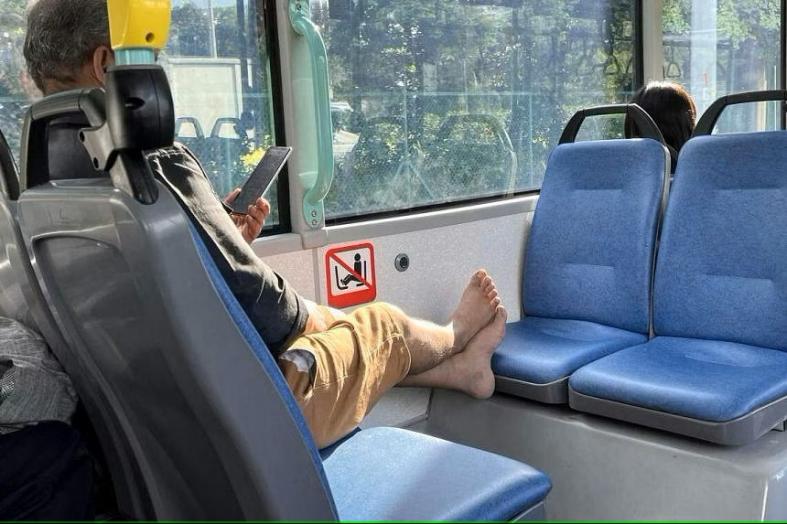
Mr Koh Ban Heng, 69, dislikes it when women continually flip their long hair on buses. He encounters this three to four times a week.
“I’ve met ladies who kept flipping their hair every few minutes. Their hair may have dandruff or whatnot, which makes it not very hygienic,” said the courier firm employee, adding that he moves away from these women.
“I don’t tell them off because I’m afraid it may create some sort of conflict between us, or that the girl may turn nasty towards me.”
Almost daily, Ms Jessie Yap encounters people talking loudly on buses – at a volume that even her noise-cancelling earpieces are unable to block out.
Though it irritates her, the 24-year-old university student chooses to keep quiet about these “temporary disturbances” as she does not want to “start drama”.
However, there are commuters who have not experienced such incidents on public transport.
Tourist Mark Ramirez, who was in Singapore for a week, said he has had a good experience with the transport system so far.
“I haven’t taken the buses, but I definitely didn’t feel disturbed or annoyed by anyone on the trains,” added the 31-year-old IT project manager from the Philippines.
Signs that promote gracious and considerate behaviour are on buses and trains, reminding passengers not to occupy more than one seat and to keep their volume down.
In response to queries, public transport operators told ST that bad behaviour is uncommon, but added that their staff are trained to communicate effectively and amicably with commuters.
Bus operator Go-Ahead Singapore said it has not observed an increase in cases recently.
Common feedback it gets regarding such behaviour includes people resting their legs on seats, putting their belongings on the seats beside them, and playing music or videos loudly on the bus.
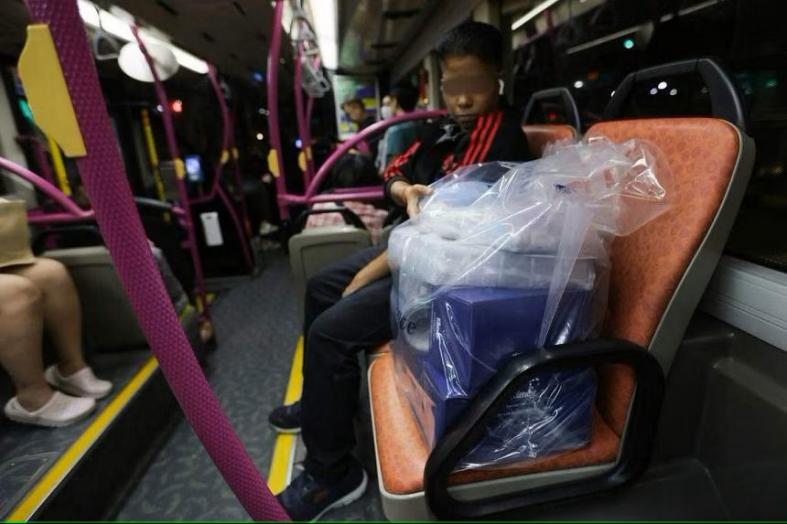
Tower Transit’s director of communications and customer experience Glenn Lim said the firm regularly encourages gracious behaviour and inclusive commuting on its social media platforms.
“(Our bus captains) will also be guided by our service controllers, who are trained in managing customer service issues,” he added. “Should the passenger continue to behave in an anti-social way, our service controllers will have little choice but to activate the police and discontinue the trip.”
SMRT Trains president Lam Sheau Kai said the transport operator has been conducting regular learning journeys and school engagement programmes to raise awareness of good commuting habits.
SBS Transit spokeswoman Grace Wu said the company has posters on buses and videos in stations to promote gracious and considerate behaviour.
The Land Transport Authority (LTA), together with the Public Transport Council, Singapore Kindness Movement and public transport operators, runs an annual campaign to encourage graciousness on public transport and to promote thoughtful behaviour on trains and buses.
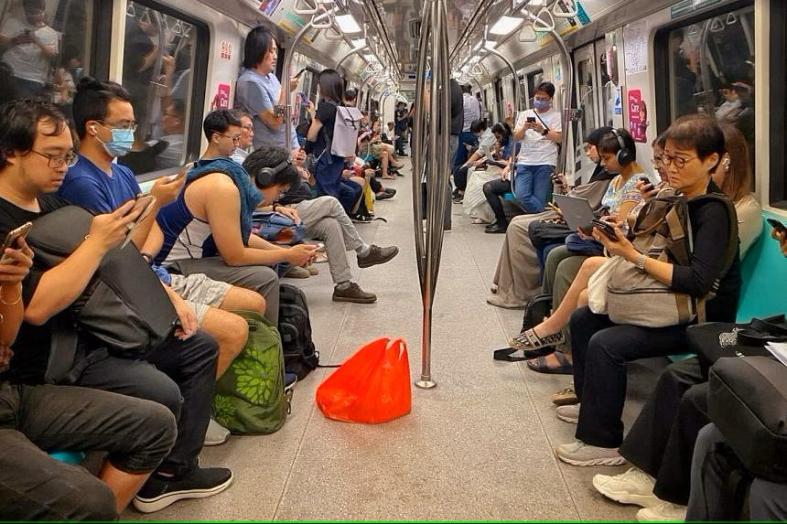
There were 42 reported cases of abuse against bus drivers from January to end-September 2023, up from 38 in the whole of 2022, said LTA in response to ST’s queries.
Unlike in Singapore, putting up one’s feet on public transport in certain cities in countries such as the United States, Canada, Australia and France will result in a fine.
The amount varies from US$50 (S$70) to A$1,100 (S$970).
In India, Mumbai’s public transport and electricity provider Brihanmumbai Electric Supply and Transport has banned passengers from watching videos or playing songs without their headphones, reported the Times of India.
In Singapore, passengers can be fined up to $500 for eating or drinking, up to $1,000 for smoking, and up to $2,000 for having flammable goods on MRT trains. However, these penalties are not enforced on buses.
Get The New Paper on your phone with the free TNP app. Download from the Apple App Store or Google Play Store now

